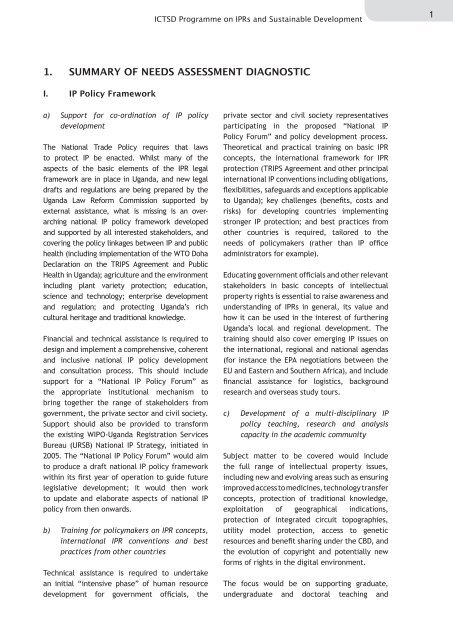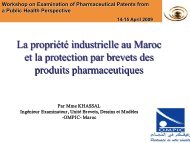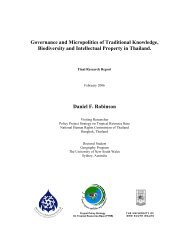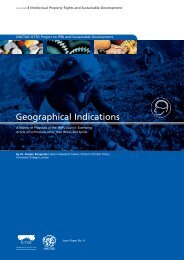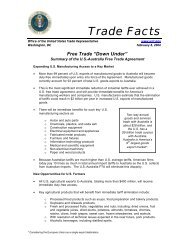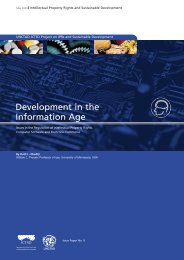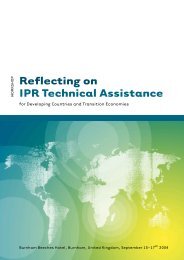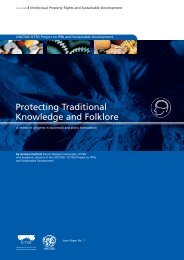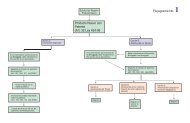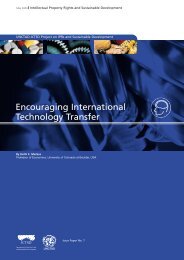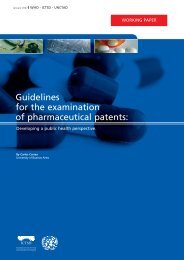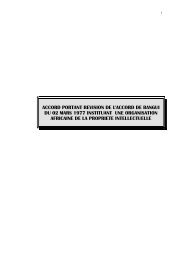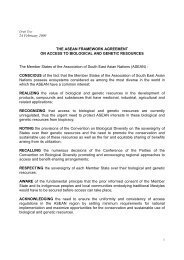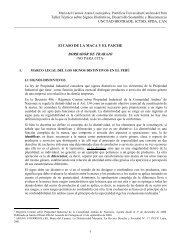Final Report of Uganda Intellectual Property ... - IPRsonline.org
Final Report of Uganda Intellectual Property ... - IPRsonline.org
Final Report of Uganda Intellectual Property ... - IPRsonline.org
Create successful ePaper yourself
Turn your PDF publications into a flip-book with our unique Google optimized e-Paper software.
ICTSD Programme on IPRs and Sustainable Development<br />
1<br />
1. SUMMARY OF NEEDS ASSESSMENT DIAGNOSTIC<br />
I. IP Policy Framework<br />
a) Support for co-ordination <strong>of</strong> IP policy<br />
development<br />
The National Trade Policy requires that laws<br />
to protect IP be enacted. Whilst many <strong>of</strong> the<br />
aspects <strong>of</strong> the basic elements <strong>of</strong> the IPR legal<br />
framework are in place in <strong>Uganda</strong>, and new legal<br />
drafts and regulations are being prepared by the<br />
<strong>Uganda</strong> Law Reform Commission supported by<br />
external assistance, what is missing is an overarching<br />
national IP policy framework developed<br />
and supported by all interested stakeholders, and<br />
covering the policy linkages between IP and public<br />
health (including implementation <strong>of</strong> the WTO Doha<br />
Declaration on the TRIPS Agreement and Public<br />
Health in <strong>Uganda</strong>); agriculture and the environment<br />
including plant variety protection; education,<br />
science and technology; enterprise development<br />
and regulation; and protecting <strong>Uganda</strong>’s rich<br />
cultural heritage and traditional knowledge.<br />
Financial and technical assistance is required to<br />
design and implement a comprehensive, coherent<br />
and inclusive national IP policy development<br />
and consultation process. This should include<br />
support for a “National IP Policy Forum” as<br />
the appropriate institutional mechanism to<br />
bring together the range <strong>of</strong> stakeholders from<br />
government, the private sector and civil society.<br />
Support should also be provided to transform<br />
the existing WIPO-<strong>Uganda</strong> Registration Services<br />
Bureau (URSB) National IP Strategy, initiated in<br />
2005. The “National IP Policy Forum” would aim<br />
to produce a draft national IP policy framework<br />
within its first year <strong>of</strong> operation to guide future<br />
legislative development; it would then work<br />
to update and elaborate aspects <strong>of</strong> national IP<br />
policy from then onwards.<br />
b) Training for policymakers on IPR concepts,<br />
international IPR conventions and best<br />
practices from other countries<br />
Technical assistance is required to undertake<br />
an initial “intensive phase” <strong>of</strong> human resource<br />
development for government <strong>of</strong>ficials, the<br />
private sector and civil society representatives<br />
participating in the proposed “National IP<br />
Policy Forum” and policy development process.<br />
Theoretical and practical training on basic IPR<br />
concepts, the international framework for IPR<br />
protection (TRIPS Agreement and other principal<br />
international IP conventions including obligations,<br />
flexibilities, safeguards and exceptions applicable<br />
to <strong>Uganda</strong>); key challenges (benefits, costs and<br />
risks) for developing countries implementing<br />
stronger IP protection; and best practices from<br />
other countries is required, tailored to the<br />
needs <strong>of</strong> policymakers (rather than IP <strong>of</strong>fice<br />
administrators for example).<br />
Educating government <strong>of</strong>ficials and other relevant<br />
stakeholders in basic concepts <strong>of</strong> intellectual<br />
property rights is essential to raise awareness and<br />
understanding <strong>of</strong> IPRs in general, its value and<br />
how it can be used in the interest <strong>of</strong> furthering<br />
<strong>Uganda</strong>’s local and regional development. The<br />
training should also cover emerging IP issues on<br />
the international, regional and national agendas<br />
(for instance the EPA negotiations between the<br />
EU and Eastern and Southern Africa), and include<br />
financial assistance for logistics, background<br />
research and overseas study tours.<br />
c) Development <strong>of</strong> a multi-disciplinary IP<br />
policy teaching, research and analysis<br />
capacity in the academic community<br />
Subject matter to be covered would include<br />
the full range <strong>of</strong> intellectual property issues,<br />
including new and evolving areas such as ensuring<br />
improved access to medicines, technology transfer<br />
concepts, protection <strong>of</strong> traditional knowledge,<br />
exploitation <strong>of</strong> geographical indications,<br />
protection <strong>of</strong> integrated circuit topographies,<br />
utility model protection, access to genetic<br />
resources and benefit sharing under the CBD, and<br />
the evolution <strong>of</strong> copyright and potentially new<br />
forms <strong>of</strong> rights in the digital environment.<br />
The focus would be on supporting graduate,<br />
undergraduate and doctoral teaching and


